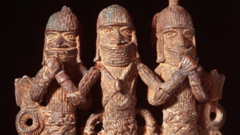Cyclist fatalities in the Netherlands are alarmingly high, prompting a national campaign for helmet use. However, cultural traditions and personal choices often overshadow safety measures, leading many to ride without helmets, creating a divide in public perception about cycling safety.
Helmet Hesitance: The Dutch Debate on Cycling Safety

Helmet Hesitance: The Dutch Debate on Cycling Safety
Despite a rise in cyclist fatalities, helmet use remains low in the Netherlands, highlighting a cultural clash between cycling pride and safety awareness.
In the Netherlands, cycling is more than a mode of transport; it's a cultural staple. Yet, the nation faces a troubling trend as statistics reveal that cyclists are the most vulnerable road users, with the Dutch Central Bureau for Statistics reporting 246 cycling deaths last year alone.
In Amsterdam, where the streets are bustling with bikers, many choose to forgo helmets, even as a government initiative seeks to change this mindset. Fallon Albrecht, a 39-year-old cyclist, illustrates this sentiment, stating, "It’s every person for themselves," as she navigates a hectic intersection without protective headgear. Her reason? A bun that simply doesn't accommodate a helmet.
The numbers paint a stark reality: since 2000, an average of 199 cyclists have died annually on Dutch roads, with many fatalities linked to head injuries. This data has ignited discussions about the balance between cycling as a cherished Dutch tradition and the pressing need for safety measures such as helmet usage.
While the government promotes helmet campaigns and discussions on road safety intensify, a deeply embedded cultural attachment to cycling—untethered from protective gear—creates barriers to progress. Although there are more bikes than residents in the country, the common sight of cyclists without helmets is a testament to personal choice often opposing safety advocacy.
As debates continue, it remains to be seen how the Netherlands can reconcile its love for cycling with the essential measures required to safeguard its cyclists' lives.





















